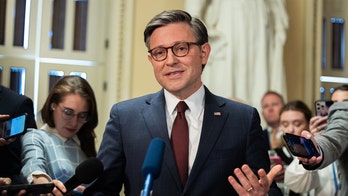As President Obama heads to New York City this week for his first speech to the United Nations General Assembly, the new world order is looking a lot fuzzier than it did a year ago.
The president's decision earlier in the week to scrap a planned missile defense shield in Eastern Europe has drawn renewed accusations that the administration is snubbing its allies and appealing to its foes.
Republicans on Sunday continued to criticize Obama for the missile decision, wringing their hands over the message it sends to the world and describing it as a gift to the Russians -- who had objected to the shield.
"This is going to be seen as a capitulation to the Russians, who had no real basis to object to what we were doing. And at the end of the day you empowered the Russians, you made Iran happy and you made the people in Eastern Europe wonder who we are as Americans," Sen. Lindsey Graham, R-S.C., said on NBC's "Meet the Press."
Graham said the administration's move "undercut two good allies, the Poles and the Czech Republic."
The Bush-era plans for the missile defense shield would have deployed 10 missile interceptors in Poland and a radar in the Czech Republic.
Obama, who blanketed the airwaves Sunday as part of his effort to sell his health care reform plan, rejected the notion that the change in strategy was anything but a response to new intelligence about Iran's capabilities.
In place of an Eastern Europe-based shield will be a different missile defense plan relying on a network of sensors and interceptor missiles based at sea, on land and in the air. Obama said that adapts to the most pressing threat from Iran to U.S. troops and allies in the Mideast and Europe -- potential attacks by short- and medium-range missiles.
"My task here is not to negotiate with the Russians," Obama told CBS' "Face the Nation." "The Russians don't make determinations about what our defense posture is."
Defense Secretary Robert Gates also wrote in The New York Times that considerations for Russia played no role in his recommendation to the president to shift course.
Obama, though, said Russia had been "paranoid" about the system and acknowledged they might end up "a little less paranoid" about the United States now.
Indeed, Russia said Saturday that it will scrap a plan to deploy missiles near Poland since Obama dropped his plan. One Russian official called it a "victory of reason over ambitions."
Intentional or not, the overture to Russia comes as the United States and other members of the U.N. Security Council prepare to re-enter talks with Iran -- even though Iran insists it will not negotiate over its nuclear program.
The State Department says Iran's posture is not a reason to refuse talks and that the U.S. plans to bring up the nuclear issue anyway.
But the effort to bridge the gap between the U.S. and Iran took another hit Friday when Iranian President Mahmoud Ahmadinejad again questioned whether the Holocaust actually happened.
All the while, relations with key and long-standing allies continue to be called into question.
The Wall Street Journal wrote Friday that under Obama, "the U.S. is working hard to create antagonists where it previously had friends." It noted that the president has also picked trade fights with Canada and Mexico, and gone to toe-to-toe with Israel over settlements in the West Bank, while seeking better ties with countries like Iran, North Korea and Burma.
Analysts say the decision to scrap the missile defense shield looks bad for the administration. But they said it could yield some good if Obama uses the overture to get Russia to put pressure on Iran.
"This only works if the Russians do help us on sanctions, if those sanctions are tough enough to make a difference, and then ultimately if Iran does stand down," The Wall Street Journal's Paul Gigot said on "FOX News Sunday."
Secretary of State Hillary Clinton said Friday during a speech at the Brookings Institution that the missile defense shift will only build on the U.S. capacity to protect itself and its allies from Iran.
She rejected the notion that it was somehow a snub to U.S. friends.
"We are not reducing our capacity to protect our interests and our allies from Iran. By contrast, we are increasing that capacity and focusing it on our best understanding of Iran's current capabilities," Clinton said. "And most of all, we would never, never walk away from our allies."
Obama, who will be the first U.S. president to be chairman of the U.N. Security Council, expects to emerge from a summit on arms control with a resolution that advances his goals of a nuclear-free world. The measure will try to put heat on Iran and North Korea, without singling out any country.
Obama plans to address the General Assembly on Wednesday and will hold a series of private talks with other heads of state.
U.N. Ambassador Susan Rice said Obama's message will be: "Everybody has a responsibility. The U.S. is leading anew. And we are looking to others to join."
The Associated Press contributed to this report.




